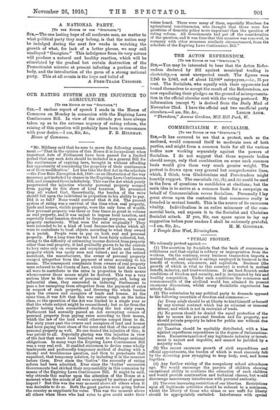OUR RATING SYSTEM AND ITS INJUSTICE TO AGRICULTURE.
pro TIM EDITOR OF THE "SPECT•TOR."1 enclose report of speech I made in the House of Commons on Monday in connexion with the Expiring Laws Continuance Bill. In view of the attitude you have always taken up as to the extreme urgency of rating reform, the raising of this question will probably have been in consonance
'with your desire.—I am, Sir, &c., F. B. MILDMA.Y. House of Commons.
"Mr. Mildmay said that he rose to move the following amend- ment That in the opinion of this House it is inexpedient when important Acts of Parliament have been passed for a limited period that any such Acts should be included in a general Bill for the continuance of expiring laws, brought in without affording fair opportunity of considering the propriety of their continuance or of their modification.' Let him take the first Act in the schedule —the Poor Rate Exemption Act, 1840—as an illustration of the way measures got included by chance in the Expiring Laws Continuance Bill, and remained there indefinitely. This was the Act which yearly perpetuated the injustice whereby personal property escaped from paying its fair share of local taxation. He presumed they all wished that, theoretically, the burden of the rates shoula fall upon the individual in proportion to his ability to pay. Did it so fall? None would contend that it did. The present system of rating was a survival of the time when real property, lands and houses, visible property, were the only form of wealth. Now personal property was three or four times as great in volume as real property, and it was unjust to impose local taxation, and especially local taxation devoted to Imperial purposes, upon real property exclusively. What were the rates originally ? They were intended to be a kind of local Income-tax under which all were to contribute to local objects according to what they owned in a parish. People were to pay on both real and personal property. For a long time the tax had been fairly collected, but, owing to the difficulty of estimating income derived from property other than real property, it had gradually grown to be the custom to levy rates only on owners and occupiers of lands and houses, property which was easily seen and valued ; and so the retired merchant, the manufacture; the owner of personal property escaped altogether from the payment of rates according to his means. The consequent complaints from owners of real property were referred to the Courts of Law, which in 1841 laid down that all were to contribute to the rates in proportion to their means whencesoever those means might be derived. This was a very serious blow to the owners of personal property, and, being an influential class, they succeeded in inducing Parliament to pass a law exempting them altogether from the payment of rates in respect of such property, and throwing the whole burden upon the owners and occupiers of lands and houses. At the same time, it was felt that this was rather rough on the latter class, so the operation of the Act was limited to a single year so that the whole subject might be reconsidered; but so far from the matter having been reconsidered during the last sixty years, Parliament had annually passed an Act exempting owners of personal property from paying rates according to their means, which the law of the land would otherwise compel them to do. For sixty years past the owners and occupiers of land and houses had been paying their share of the rates and that of the owners of personal property as well. No one denied the injustice of this ; it was patent to all. Especially glaring was this injustice in view of the fact that much local taxation went to discharge national obligations. In many ways the Expiring Laws Continuance Bill was a very real evil. It enabled statesmen to devise some wholly inadequate and professedly temporary method of dealing with a thorny and troublesome question, and then to perpetuate that expedient, that temporary solution, by including it in the measure before them. Ever since the 'forties' the necessity of rating reform had been admitted. Ever since the 'forties' successive Governments had skirked their responsibility in this connexion by moans of the Expiring Laws Continuance Bill. It might be said, why obtrude this matter upon the attention of the blouse at a moment when the minds of all were occupied by matters of graver import ? But this was the very moment above all others when it was desirable to do so. Both the great parties were going before the country as suppliants for votes. This was the moment above all others when those who had votes to give could make their
voices heard. There were many of them, especially Members for agricultural constituencies, who thought that there were few questions of domestic policy more important than the question of rating reform. All Governments had put off the consideration of the question, and it was time that this measure was removed, in company with other measures similarly circumstanced, from the schedule of the Expiring Laws Continuance Bill."


















































 Previous page
Previous page